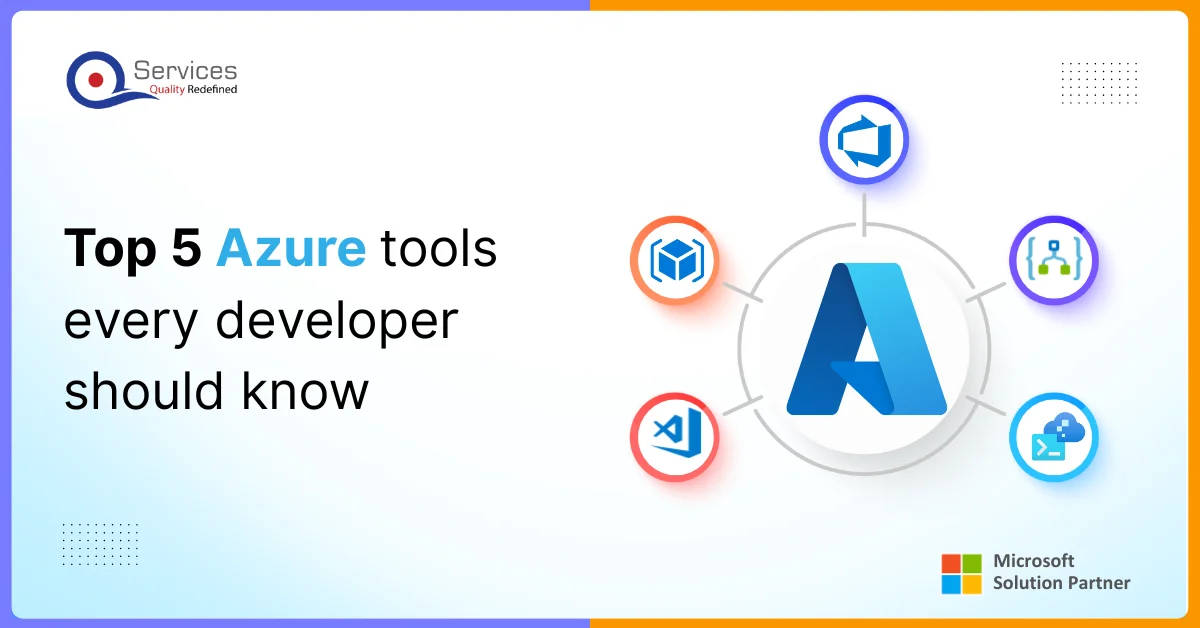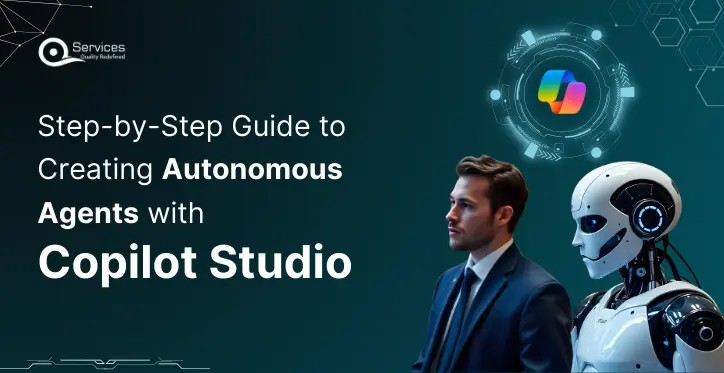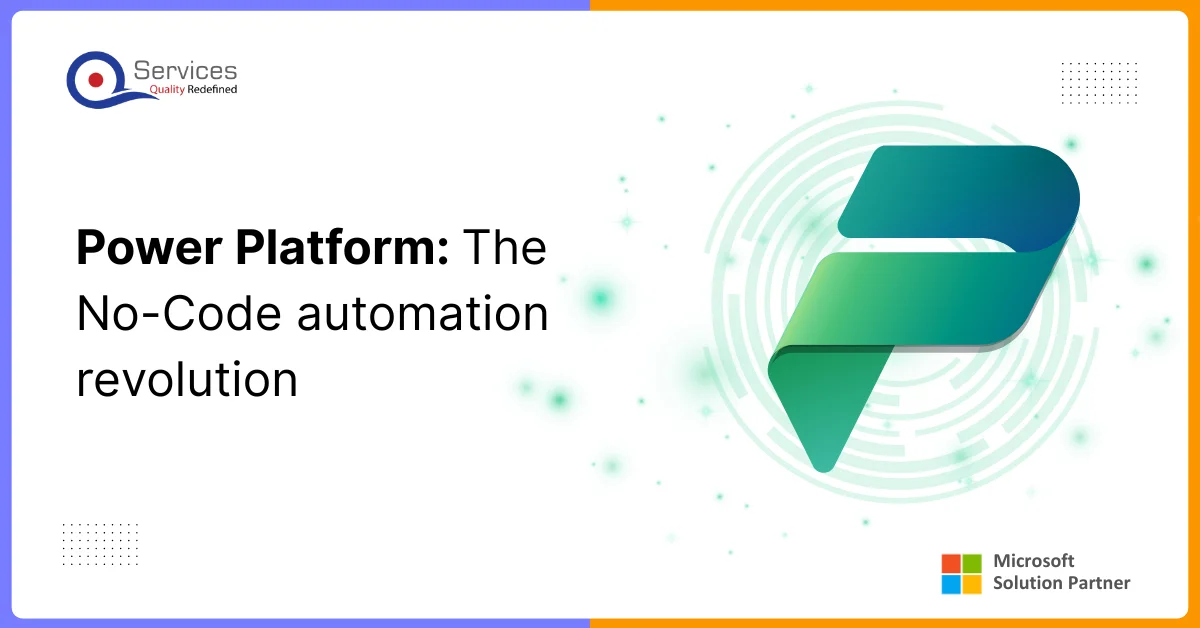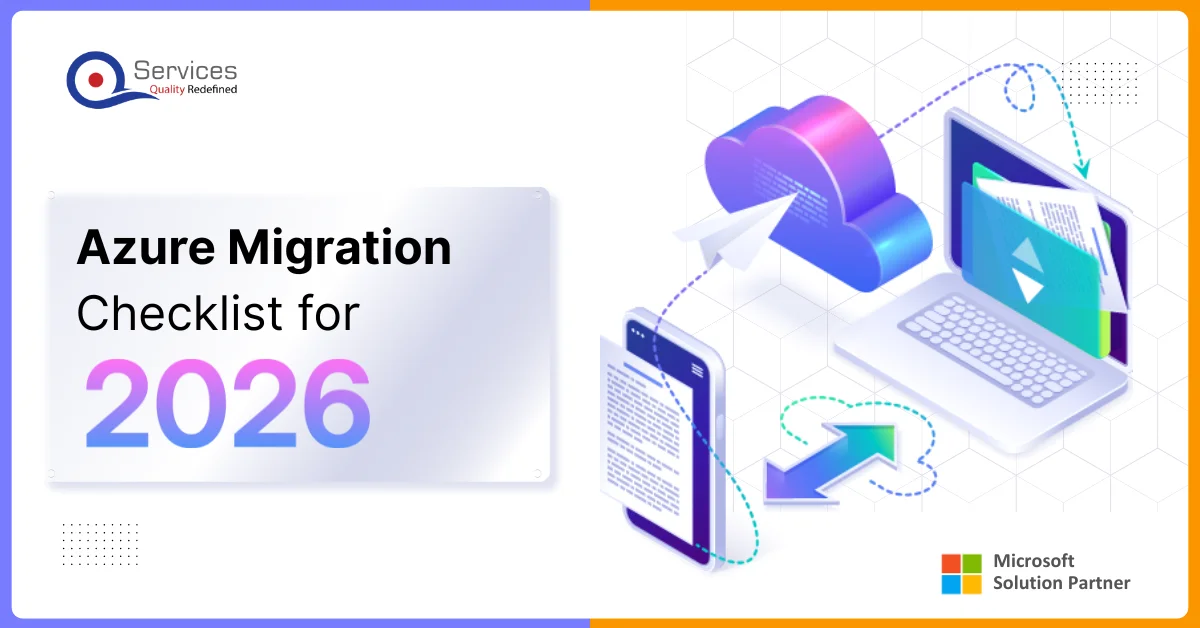
Home » Step-by-Step Guide to Creating Autonomous Agents with Copilot Studio

Just imagine having an AI assistant that never sleeps, answers questions instantly, automates repetitive tasks, and continuously improves its performance—all without requiring complex coding. Sounds like a fiction?
Not anymore. With Microsoft Copilot Studio, you can easily create autonomous AI agents that handle tasks, conversations, and workflows with minimal effort. Whether you’re looking to build a virtual assistant, streamline customer service, or enhance internal processes, this guide has you covered.
Follow along as we walk you through each step of building and deploying intelligent AI agents that redefine what’s possible in business automation.
With co-pilot studio, building AI autonomous agents is simple and accessible. Whether you’re a developer or not, you can create smart agents that automate tasks and improve workflows, all while integrating easily with Microsoft 365 and Azure Bot Services.
With low-code approach, Microsoft Copilot Studio allows both technical and non-technical users to develop autonomous AI agents that operate with minimal human oversight. These autonomous agents can automate repetitive tasks and enhance business operations. Thanks to seamless integration with Microsoft 365 and Azure Bot Services, MS copilot studio helps organizations integrate these AI-powered solutions into their existing Microsoft tools, streamlining workflows and enhancing productivity with ease.
An autonomous agent is an AI which can do its job and make decisions on its own, without needing a lot of human help. It uses AI to learn and adapt, helping automate tasks and making work easier across many industries.
Autonomous agents are transforming many sectors, including:
Customer Service: AI-driven chatbots and virtual assistants handle customer queries around the clock.
E-commerce: Microsoft AI agents optimize inventory, suggest products, and personalize shopping experiences.
Healthcare: Autonomous agents assist with patient care, diagnostics, and administrative work.
Microsoft’s AI agent solutions, like Azure Bot Services, enable businesses to automate tasks and enhance user interactions.
You can use Copilot Studio in two ways—online through the web app or directly in Microsoft Teams.
Before jumping in, get clear on what your agent needs to do.
Make sure your agent has the right information to get the job done.
Ready to build your first AI agent? Follow these easy steps in Copilot Studio to create a new AI agent that’s smart, responsive, and ready to work for you.
Open Copilot Studio through the web or Microsoft Teams and head to the agent creation dashboard. Hit New Agent to get started!
Think about what your agent needs to do.
Make your agent smarter and more responsive.
Make your agent smarter and more helpful.
Test the agent before launch.
Time to launch your agent!
Take Microsoft 365 Copilot to the next level by creating autonomous AI agents tailored to your business.
Make your AI agents smarter with live data and external integrations.
Design AI agents that are smart and engaging for users.
Get free Consultation and let us know your project idea to turn into an amazing digital product.
AI chatbots are transforming customer support:
They can answer common questions about products or services, so human agents can focus on more complicated issues.
These bots work around the clock, so your customers can get help anytime, day or night.
Chatbots use data to deliver responses that make interactions feel more custom, leading to a better customer experience.
It links directly to your CRM system, ensuring all customer details are updated and interactions are tracked for future reference.
Virtual assistants are making scheduling and tasks a lot easier:
They can help schedule patient appointments, send reminders, and even manage patient records. Healthcare professionals can also quickly access important info when needed.
These assistants can automate interview scheduling; process leave requests and help onboard new employees.
AI agents are perfect for making sense of all that data:
They gather data from everywhere—social media, internal databases, and more—to help businesses make quicker decisions.
AI agents can analyze that data to identify trends which can help you make better business choices.
Forget manual reports! AI can generate performance updates and dashboards automatically.
Using machine learning, AI can forecast future trends and help businesses plan ahead.
In the world of e-commerce, AI is the game changer.
AI analyzes customer behavior and suggests products they’re likely to buy, boosting sales and customer satisfaction.
AI helps to predict products that will be in demand, so you can keep stock levels just appropriate.
With AI, customers can get real-time updates on their orders, making them feel more connected.
After the sale, AI can assist with returns, exchanges, or any other inquiries, making sure customers stay satisfied.
Ensure your AI agent is working as expected with regular testing. Test it in a variety of situations, identify any issues, and fix them to maintain smooth performance.
AI agents often handle sensitive user data, so it’s important to follow legal guidelines. Protect user data with strong encryption methods and security protocols, making sure you follow all relevant compliance regulations.
AI agents need to be updated regularly to keep working well. Track how they’re performing, listen to what users have to say, and make improvements so the agent can keep up with changing needs and become even more effective.
Like with any tool, you might run into some issues when using Microsoft Copilot Studio. Here’s how to handle the most common ones:
If your agent won’t deploy, check your settings and permissions. Sometimes, errors happen due to missing configurations. Try resetting or redeploying your agent to see if that solves the issue.
Many AI agents need to pull data from external sources like APIs or CRMs. If you’re having problems, make sure your API credentials are entered correctly and that the external data is formatted properly. A quick check of the connection settings can help resolve issues.
Copilot Studio has built-in debugging tools that let you see what’s going wrong. Check the logs to find out if the problem is with the data, workflows, or integrations. Once you find the issue, fix it and test the agent again.
Understanding these limitations and knowing how to troubleshoot common problems will help you get the most out of Microsoft Copilot Studio while keeping things running smoothly.
Microsoft is continuously evolving AI to create smarter, more connected systems that push the boundaries of what technology can do. Here’s a look at some key areas of their focus:
Cloud-based solutions that bring scalable AI capabilities to businesses, with recent improvements in natural language processing, machine learning models, and data analytics tools that make AI adoption seamless and more effective.
Integrating AI into core Microsoft tools like Word, Excel, and Outlook, Copilot enhances productivity with smart features like task automation, real-time suggestions, and better workflow management, all directly within the user’s favorite applications.
Microsoft is dedicated to ethical AI, ensuring fairness, accountability, and transparency in its development to make sure AI technology benefits society as a whole.
With advanced AI tools like speech-to-text transcription and image recognition for the visually impaired, Microsoft is making strides to improve accessibility and help people with disabilities thrive.
MS Copilot Studio will bring new features that enhance its AI capabilities:
More seamless integration between AI tools and third-party services will allow users to automate and streamline workflows more efficiently.
AI that can process and understand multiple data types at once—like text, images, and audio—will create richer, more intuitive interactions.
With improved collaboration capabilities, Copilot will enable AI agents to work hand-in-hand with users and other systems in real-time, enhancing productivity and problem-solving through collective input.

In this guide, we’ve shown how Microsoft Copilot Studio allows businesses to create autonomous AI agents that automate workflows and improve productivity. With its easy-to-use interface, even those without coding experience can build AI-powered agents that drive results. The integration with Microsoft 365 and Azure Bot Services ensures these agents fit seamlessly into existing business environments.
As Microsoft keeps enhancing Copilot Studio with advanced multimodal AI models, the future of AI continues to evolve, offering businesses more powerful and efficient ways to interact with AI technology. So, why wait? Start creating your own intelligent AI agents today and unlock the potential to transform your business!

As this year closes, no-code automation is steering digital transformation across industries. Businesses that began with low-code tools are now scaling faster through Power platform development strategies. Many are realizing that innovation, security, and efficiency can coexist when automation is built on Microsoft Power platform.

In 2026, moving workloads to Azure cloud migration is not just about transferring data. It’s about making the whole process smarter, more automatic, and easier to manage while keeping compliance and security tight.

The way small and medium-sized businesses (SMBs) operate has changed more in the past five years. Traditional systems that once felt reliable are now holding teams back. Data lives in silos, processes rely on too much manual work, and the cost of maintaining legacy servers keeps growing. So how do businesses modernize without disrupting what’s already working?
To begin, simply access Copilot Studio within Microsoft 365, create a new project, and follow the setup instructions to define the purpose of your agent.
In Copilot Studio, click on “Create New Agent,” give your agent a name and description, then configure the initial settings to start building.
Autonomous agents can handle tasks like customer support, automate scheduling, manage data retrieval, and much more.
To ensure accuracy, regularly update the knowledge base, and source data from reliable, trusted systems.
Yes, some agents can incorporate machine learning to improve over time, learning from user interactions to provide more relevant and effective responses.
While powerful, autonomous agents may struggle with highly complex queries or understanding nuanced human language, requiring ongoing refinement.
Share your feedback through the built-in tools within Copilot Studio or participate in user forums and surveys to contribute to future improvements.
Yes, Copilot Studio supports collaborative projects, allowing multiple users to work together on building and refining AI agents.
Advanced features include multimodal AI models, enhanced orchestration, and seamless integration with other Microsoft tools to create more powerful agents.
Establish clear guidelines for the agent’s behavior, regularly review its actions, and ensure compliance with company policies and industry regulations.
Microsoft offers tutorials, detailed documentation, and training courses to help you master Copilot Studio and create powerful AI agents.
Gather and analyze user feedback regularly to identify areas for improvement, and refine your agent based on real-world interactions.

Founder and CEO

Chief Sales Officer
